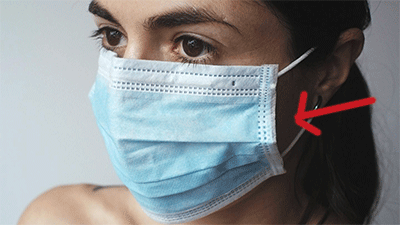
How to wear a mask properly
Wearing a mask might seem like a simple task, but it appears that it is very easy to get wrong.
I speak from personal experience: the first time I wore a disposable mask was upon entry into the Apple store.
My 12 year old daughter laughed at me when I didn't realise that I had to expand the concertina portion of the mask, pulling it down under my chin. Instead, I had tried to wear it as a large band-aid stretched across my face! (I also didn't know there was a metal bit to pinch over my nose to make it fit.)
After seeing masks worn upside down, inside out and not covering the nose at all, we thought we'd put together a resource to help our community make sure they are wearing their mask properly. After all, if you are not wearing your mask properly, you may as well not be wearing one at all.
Wearing your mask properly is especially important for people at risk and those caring for people at risk.
Here are the steps to remember when putting on a mask
- Sanitise your hands before you put your mask on.
- Use the ear loops to put it on.
- Make sure the mask covers your nose.
- Make sure the mask extends under your chin.
- Pinch the top part of the mask so it fits across the bridge of your nose.
If you don't do anything else, just make sure it covers your nose and extends under your chin!
Here is how the mask should look:

Here are the steps to remember when taking off on a mask
- Sanitise your hands before you take off your mask.
- Use the ear strings to remove it.
- Dispose of it straight away, don't leave it hanging on your arm or neck.
- Sanitise your hands after taking off your face mask.
The Australian Govt has released this short video with instructions on how to wear a mask properly:
How often can I wear the same mask?
How often you can wear the same mask depends on the type of mask. Here are some tips:
- Never re-use single-use (disposable) masks. These masks are often white or white and blue and look like ones worn in a hospital.
- Cloth masks should be washed each day after use, or when wet or visibly dirty.
- It's a good idea to have at least 2 cloth masks so you can interchange them: whilst one is in the wash you can wear the other one.
- Masks can be washed in the washing machine (preferably at 60 degrees C) with other clothes.
- Dry the cloth mask in the clothes dryer or in fresh air before you re-use it.
How to stop a mask from gaping at the sides
If you have a small face, wearing a disposable mask may be hard - the ear strings can often be too long or the sides open too much (gape).

Here is a super trick to getting a surgical/disposable mask fitting perfectly.
How to make a cloth mask
- Picture instructions from the Australian Govt.
- My mum has used this video to make masks for her entire retirement village!
Her tips were: "This is the best fit. I used a long tie as didn’t have pony tail holders. Used knit fabric like an old t shirt, as it has some give when tied. Must be long enough to tie easily."
What are the latest rules around facemask wearing?
Each state has its own rules, see the latest guidelines below:
- Rules in NSW
- Rules in QLD
- Rules in VIC
- Rules in SA
- Rules in WA
- Rules in ACT
- Rules in TAS
- Rules in NT
Help with mask wearing for people with autism
A person with autism may not be able to tolerate face masks.
Their neurology can make them more sensitive than other people to touch and texture, and many cannot bear the feeling of having their nose and mouth covered by fabric.
We have created a resource to help carers, parents and support workers assist young people with autism to wear masks.
Wearing masks for people with autism
NDIS THERAPY FINDER - FREE SERVICE
LET US FIND YOU A SKILLED SUPPORT WORKER



